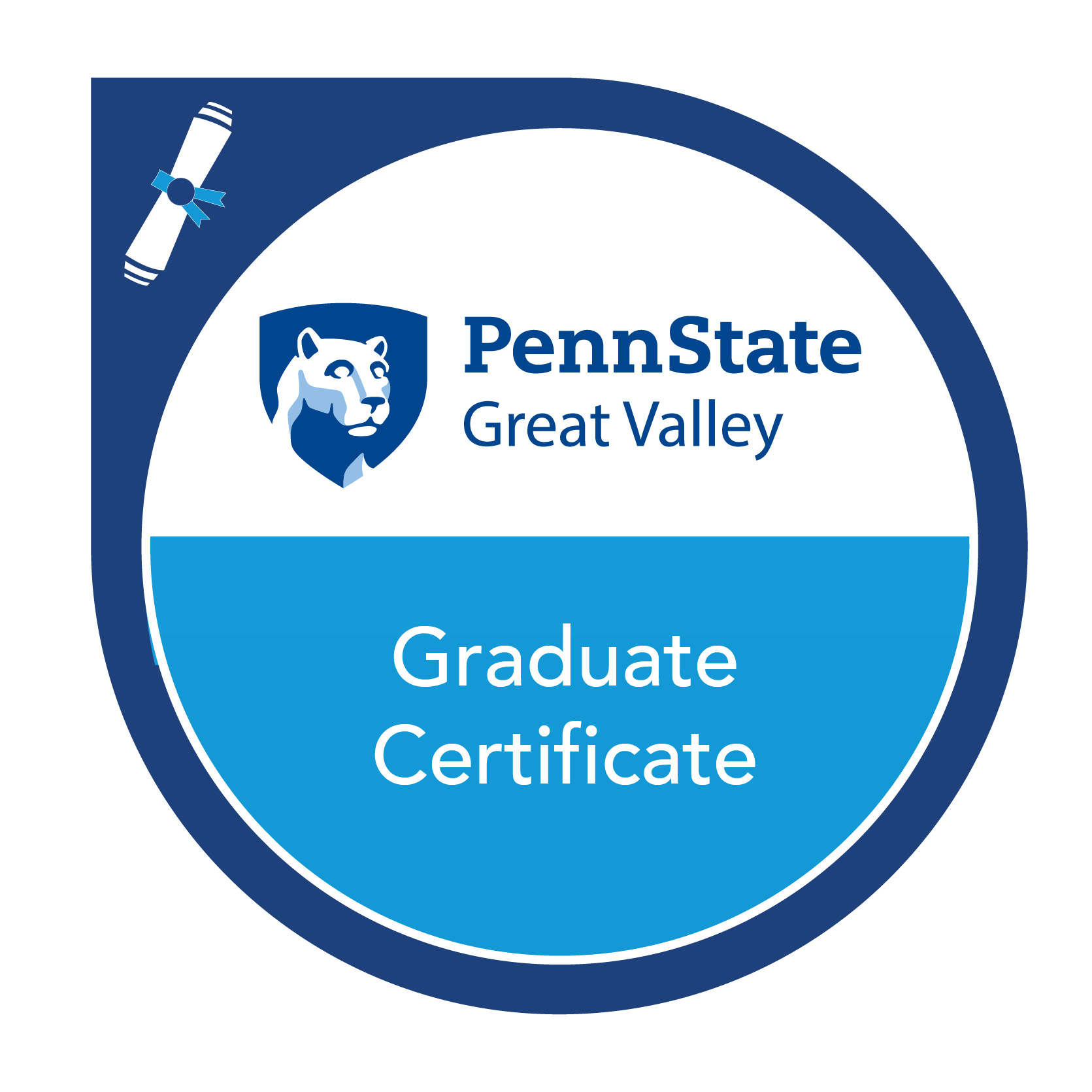100% Online
Complete your Penn State course work at your own pace and 100% online.
Application deadline
Credits and costs
Stackable Credentials
This program is embedded within the Master of Engineering in Systems Engineering credential.
Build System Modeling and Analysis Skills
Understand different types of systems and models, model verification and validation processes, and sources of randomness in computer simulation.
Use system simulation modeling for multi-level systems analysis and systems optimization.
Apply model-based systems engineering practices to design and engineer complex systems.
Develop, document, and analyze the technical aspects of a system in any life-cycle phase (concept, design, implementation, operation, and maintenance).
System Modeling and Analysis Online Courses
System Modeling and Analysis Online Courses
As a student in this online engineering certificate program, your course work will help you gain a deep understanding of:
- discrete-time simulation and models for system analysis and optimization
- system dynamic models for system analysis and optimization
- model-based system design, architecting, and engineering
- SysML, systems modeling language
- digital model development and management across system life cycle
Required Courses (9 credits)
- 3credits
This course examines the use of discrete-time approaches to build integrated models and their application to systems engineering. The students also gain hands-on experience on additional topics such as simulation-based optimization by using a commercial simulation software package.
- 3credits
This course addresses system dynamics modeling and simulation for the analysis of complex systems. Students are exposed to the techniques used to form models of supply-demand, mechanical, electrical, biological, and hybrid systems.
- 3credits
This course covers the fundamental concepts, techniques, and methods for creating and analyzing system architecture of complex systems.
Using Certificate Credits toward a Stackable Credentials Degree Pathway
As part of the stackable pathway, the courses required for this 9-credit certificate can also be applied to a Master of Engineering in Systems Engineering if you apply and are accepted into the program. If you have been accepted into this certificate program, you will not be charged an additional fee to apply for the Master of Engineering in Systems Engineering program.
Courses may also apply to other degree programs. Students should contact their adviser to discuss transfer credit policies and application fees and details.
Course Availability
If you're ready to see when your courses will be offered, visit our public LionPATH course search (opens in new window) to start planning ahead.
Start or Advance Your Career

Start or Advance Your Career
You can use the knowledge gained from this online graduate certificate program and the support of Penn State career resources to succeed in a variety of engineering roles, including systems test engineer, system analyst, business analyst, product design engineer, system engineer, and more.
Career Services to Set You Up for Success

From the day you're accepted as a student, you can access resources and tools provided by Penn State World Campus Career Services to further your career. These resources are beneficial whether you're searching for a job or advancing in an established career.
- Opportunities to connect with employers
- Career counselor/coach support
- Occupation and salary information
- Internships
- Graduate school resources
Ready to Learn More?
Get the resources you need to make informed decisions about your education. Request information on this program and other programs of interest by completing this form.
Ready to take the next step toward your Penn State graduate certificate?
Costs and Financial Aid
Costs and Financial Aid
Learn about this program's tuition, fees, scholarship opportunities, grants, payment options, and military benefits.
Costs and Financial Aid
Graduate Tuition
Graduate tuition is calculated based on the number of credits for which you register. Tuition is due shortly after each semester begins and rates are assessed every semester of enrollment.
2024–25 Academic Year Rates
| How many credits do you plan to take per semester? | Cost |
|---|---|
| 11 or fewer | $1,027 per credit |
| 12 or more | $12,325 per semester |
2025–26 Academic Year Rates
| How many credits do you plan to take per semester? | Cost |
|---|---|
| 11 or fewer | $1,037 per credit |
| 12 or more | $12,448 per semester |
Paying for Your Certificate
Students pursuing a certificate are considered "nondegree," a status that is not eligible for federal student aid, including the Federal Direct Stafford Loan program. A private alternative loan may be an option to consider.
Additionally, Penn State offers many ways to pay for your education, including an installment plan and third-party payments. Penn State World Campus also offers an Employer Reimbursement and Tuition Deferment Plan. Learn more about the options for paying for your education.
Students pursuing a degree and meeting all other eligibility requirements may qualify for financial aid.
Military Benefits
Military service members, veterans, and their spouses or dependents should explore these potential military education benefits and financial aid opportunities, as well.
Additional Cost of Attendance Details
To view the detailed list of cost of attendance elements:
- visit the Tuition Information site
- click the plus sign to expand the table
- select a semester from the World Campus row
Technical Requirements
Review the technical requirements for this program.
Earn Stackable Credentials on the Way to a Master's Degree

Earn Stackable Credentials on the Way to a Master's Degree
This certificate can serve as a stand-alone credential and as a step on your journey toward a Master of Engineering in Systems Engineering. Stackable credentials recognize your new skills and knowledge while you work toward your master's degree — with no additional application fees.
Earning graduate certificates from Penn State World Campus is a great way to gain new skills and quickly add valuable credentials to your résumé.
This graduate certificate’s courses satisfy requirements toward the following degree(s):
Collaborate with your peers as you learn to identify, analyze, and manage complex systems and processes. This cohort-based online master's degree program encourages systems engineering students to build ties and gain perspectives from their peers in other disciplines.
Learn more about the Master of Engineering in Systems EngineeringShow Your Progress with a Digital Badge
Show Your Progress with a Digital Badge
Upon completion of this program, Penn State awards you a graduate certificate and a digital badge from Credly.

Certificate earners are awarded a digital badge for each certificate they complete as part of this stackable credentials group. Badges can be displayed digitally to recognize your accomplishment of attaining a new level of knowledge.
Who Should Apply?
This program is designed to help students with an undergraduate degree in engineering, physics, chemistry, mathematics, or computer science.
Set Your Own Pace

Whether you are looking to finish your program as quickly as possible or balance your studies with your busy life, Penn State World Campus can help you achieve your education goals. Many students take one or two courses per semester.
Convenient Online Format
This program's convenient online format gives you the flexibility you need to study around your busy schedule. You can skip the lengthy commute without sacrificing the quality of your education and prepare yourself for more rewarding career opportunities without leaving your home.
A Trusted Leader in Online Education

Penn State has a history of more than 100 years of distance education, and World Campus has been a leader in online learning for more than two decades. Our online learning environment offers the same quality education that our students experience on campus.
Information for Military and Veterans

Are you a member of the military, a veteran, or a military spouse? Please visit our military website for additional information regarding financial aid, transfer credits, and application instructions.
How to Apply to Penn State

How to Apply to Penn State
Apply by July 15 to start August 25
Application Instructions
Deadlines and Important Dates
Complete your application and submit all required materials by the appropriate deadline. Your deadline will depend on the semester you plan to start your courses.
Fall Deadline
Apply by July 15 to start August 25Spring Deadline
Apply by November 15 to start January 12Summer Deadline
Apply by April 15, 2026, to start May 18, 2026
Steps to Apply
For admission to the J. Jeffrey and Ann Marie Fox Graduate School, an applicant must hold either (1) a baccalaureate degree from a regionally accredited U.S. institution or (2) a tertiary (postsecondary) degree that is deemed comparable to a four-year bachelor's degree from a regionally accredited U.S. institution. This degree must be from an officially recognized degree-granting institution in the country in which it operates.
The program contains a number of courses requiring a solid background in mathematics, typically found in an undergraduate program in engineering, physics, chemistry, mathematics, or computer science, with at least two semesters of calculus. Students with other undergraduate majors with a strong background in mathematics may apply. The admissions committee will consider the academic background, as evidenced by the transcript, as part of the overall application.
All applicants are expected to have earned a junior/senior grade-point average of 3.0 or higher.
You will need to upload the following items as part of your application:
Official transcripts from each institution attended, regardless of the number of credits or semesters completed. Transcripts not in English must be accompanied by a certified translation. If you are a Penn State alum, you do not need to request transcripts for credits earned at Penn State but must list Penn State as part of your academic history.
Test Scores — GRE/GMAT scores are not required and will not be reviewed.
English Proficiency — The language of instruction at Penn State is English. With some exceptions, international applicants must take and submit scores for the Test of English as a Foreign Language (TOEFL) or International English Language Testing System (IELTS). Minimum test scores and exceptions are found in the English Proficiency section on the Fox Graduate School's "Requirements for Graduate Admission" page. Visit the TOEFL website for testing information. Penn State's institutional code is 2660.
To begin the online application, you will need a Penn State account.
Create a New Penn State Account
If you have any problems during this process, contact an admissions counselor at [email protected].
Please note: Former Penn State students may not need to complete the admissions application or create a new Penn State account. Please visit our Returning Students page for instructions.
Stackable Credentials Application Fee Waiver
If you have been previously accepted to a program with stackable credentials, you will not be charged an additional application fee for any associated programs.
Associated programs in the systems engineering stack:
Certificates
- Graduate Certificate in Life-Cycle System Design
- Graduate Certificate in System Modeling and Analysis
- Graduate Certificate in System Quality & Risk Evaluation
- Graduate Certificate in Technical Management
Degree
- Master of Engineering in Systems Engineering
If you begin with a certificate and are interested in pursuing the Master of Engineering in Systems Engineering, work with your adviser while completing your first certificate to determine which program to apply to next.
Up to 15 credits earned in any of these certificate programs may be transferred to the master's degree in systems engineering, subject to restrictions outlined in GCAC-309 Transfer Credit.
You can begin your online application at any time. Your progress within the online application system will be saved as you go, allowing you to return at any point as you gather additional information and required materials.
- Choose Enrollment Type: "Certificate Admission"
- Choose "WORLD CAMPUS" as the campus
Checking Your Status
You can check the status of your application by using the same login information established for the online application form.6. Complete the application.
Admissions Help
If you have questions about the admissions process, contact an admissions counselor at [email protected].
Current Penn State students should contact [email protected] with questions and for assistance.
Contact Us

Contact Us
Have questions or want more information? We're happy to talk.
For general questions about the program:
Dr. Amanda Neill
[email protected]
For general questions about Penn State World Campus:
World Campus Admissions Counselors
Phone: 814-863-5386
[email protected]
Learn from the Best
Learn from the Best
The Graduate Certificate in System Modeling and Analysis program is offered in partnership with the Penn State Great Valley School of Graduate Professional Studies.
Faculty
Mohamad Darayi
- DegreePh.D., Industrial and Systems Engineering, University of Oklahoma
- DegreeM.S., Industrial Engineering, Tarbiat Modares University
- DegreeB.S., Industrial Engineering, University of Tabriz
Dr. Mohamad Darayi, assistant professor of systems engineering, focuses his principal research and key publications on infrastructure network resilience and simulation modeling applications in health care, manufacturing, and supply chain management. He teaches courses in system simulation, risk analysis, network modeling, and data analytics.
Joanna F. DeFranco
- DegreePh.D., Computer and Information Science, New Jersey Institute of Technology
- DegreeM.S., Computer Engineering, Villanova University
- DegreeB.S., Electrical Engineering and Math, Penn State
Dr. Joanna F. DeFranco is an assistant professor of software engineering. She has worked as an electronics engineer for the Navy and as a software engineer at Motorola. Her research interests include software engineering teams, effective teamwork, Internet of Things, and software-intensive critical systems.
Nil Ergin
- DegreePh.D., Systems Engineering, Missouri University of Science and Technology
- DegreeM.S., Engineering Management, Missouri University of Science and Technology
- DegreeB.S., Environmental Engineering, Istanbul Technical University
Dr. Nil Ergin, associate professor of systems engineering, researches system of systems engineering, complex adaptive systems, model-based systems engineering, and multi-agent systems. Dr. Ergin is also affiliated with the Systems Engineering Research Center (SERC), a DoD–funded University Affiliated Research Center, where she works on collaborative research efforts among multiple universities. She is a member of IEEE and INCOSE.
Kathryn Jablokow
- DegreePh.D., Electrical Engineering, Ohio State University
- DegreeM.S., Electrical Engineering, Ohio State University
- DegreeB.S., Electrical Engineering, Ohio State University
Dr. Kathryn Jablokow is a professor of engineering design and mechanical engineering. She is an experienced researcher, with special expertise in design cognition, engineering creativity, and high-performance design teams. She is also an award-winning educator who has developed multiple engineering courses related to problem solving, creativity, and invention, including a massive open online course that has attracted more than 250,000 learners since 2013. She investigates the human side of engineering and the effects that individual cognitive differences have on the processes and products of design.
Mohamad Kassab
- DegreePh.D., Computer Science, Concordia University
- DegreeM.S., Computer Science, Concordia University
- DegreeB.S., Computer Science, University of Windsor
- DegreeB. Eng., Computer Engineering, Lebanese American University
Dr. Mohamad Kassab is an assistant professor of software engineering. His research includes requirements engineering, software architecture, software quality, software measurements, and the Internet of Things. He has published extensively in software engineering books and journals. With more than 17 years of industrial experiences, he also worked in different industrial roles. Dr. Kassab teaches courses in requirements engineering, software testing, and software architecture and design.
Phillip A. Laplante
- DegreePh.D., Computer Science, Stevens Institute of Technology
- DegreeM.B.A., University of Colorado
- DegreeM.Eng., Electrical Engineering, Stevens Institute of Technology
- DegreeB.S., Systems Planning and Management, Stevens Institute of Technology
Dr. Phillip A. Laplante is a professor of software and systems engineering. He has an extensive list of publications and deep practical experience in requirements engineering, development, testing, and project management for a variety of complex systems, including safety critical and embedded ones. He is widely recognized for work in real-time systems, real-time imaging, and applications in the Internet of Things. He is also a pioneer in licensing of software engineers, having led the development and acceptance of the first licensure exam for software engineers in the United States.
Ashkan Negahban
- DegreePh.D., Industrial and Systems Engineering, Auburn University
- DegreeM.E., Industrial and Systems Engineering, Auburn University
- DegreeB.S., Industrial and Systems Engineering, University of Tehran
Dr. Ashkan Negahban is an associate professor of engineering management. Prior to joining Penn State, he was an instructor at Auburn University, where he taught courses in simulation, probability theory, and statistics. His research interests include the application of different types of simulation (discrete event, agent-based, and Monte Carlo) in design and operation of complex systems. He has developed several e-learning modules that have received worldwide publicity and are used by faculty from leading institutions around the world.
Colin Neill
- DegreePh.D., Software and Systems Engineering, University of Wales Swansea
- DegreeM.Sc., Communications Systems, University of Wales Swansea
- DegreeB.Eng., Electrical Engineering, University of Wales Swansea
Dr. Colin Neill is a professor of software engineering and systems engineering. He teaches many courses in software and systems engineering and project management. He is the author of more than 80 articles on the development and evolution of complex software and systems and their management and governance. Dr. Neill is a senior member of the IEEE and a member of INCOSE, and he serves as associate editor-in-chief of Innovations in Systems and Software Engineering.
Raghvinder S. Sangwan
- DegreePh.D., Computer and Information Sciences, Temple University
- DegreeM.S., Computer Science, West Chester University
- DegreeB.S., Genetics and Plant Breeding, Haryana Agricultural University
Dr. Raghvinder S. Sangwan is a professor of software engineering with expertise in the analysis, design, and development of large-scale, software-intensive systems and the use of AI engineering to design and develop intelligent systems that are safe, secure, and trustworthy. His research focuses on the improvement of these practices, and he has taught related courses to engineers and project managers at many prestigious academic, government, and industry organizations worldwide. Dr. Sangwan actively consults for Siemens Corporate Technology in Princeton, New Jersey, and holds a visiting scientist appointment at the Software Engineering Institute at Carnegie Mellon University in Pittsburgh, Pennsylvania. He is a distinguished contributor and senior member of IEEE and a senior member of ACM.
Kailasam Satyamurthy
- DegreePh.D., Engineering Mechanics, Clemson University
- DegreeM.S., Civil Engineering, Clemson University
- DegreeMBA, Penn State
- DegreeB.S., Civil Engineering, University of Madras
Dr. Kailasam Satyamurthy, assistant professor of engineering, teaches decision and risk analysis, finance and economics for engineers, statistics, optimization, and continuous improvement courses. He held managerial positions at Vanguard and at GenCorp and conducted extensive research in the finite element modeling of nonlinear mechanical and thermal systems. He has vast experience in Six Sigma quality and continuous improvement, and has trained numerous professionals in manufacturing, transactional, and health care industries.
Doug Schumer
- DegreePh.D., Electrical Systems and Engineering, Rensselaer Polytechnic Institute
- DegreeM.S., Measurement and Control, Carnegie Mellon University
- DegreeB.S., Physics, Carnegie Mellon University
Dr. Doug Schumer is assistant professor of engineering design and faculty director of the REV-UP Center for Entrepreneurship. Following 20 years in industry leading medical device R&D, Dr. Schumer held the position of Rensselaer Polytechnic Institute's professor of practice in biomedical engineering and served as Georgia Tech's first director of design innovation and education. He is a member of the New York Academy of Sciences and the American Physical Society.

We Are Penn State Online
This is the real Penn State. You will take courses with curriculum developed by the same professors who teach on campus. You can expect the same caliber of academic quality that you associate with Penn State.
